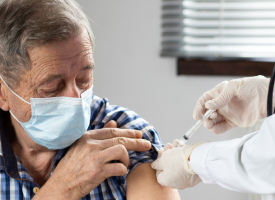AMA Transcript - Dr Gannon, ABC Radio National - Public hospital funding
Transcript: AMA President, Dr Michael Gannon, ABC Radio, National Wrap with Patricia Karvelas, Sunday 13 May 2018
Subject: Public hospital funding, medical workforce shortages, private health insurance affordability
PATRICIA KARVELAS: In two weeks Australian Medical Association President Michael Gannon will step down from that role, leaving behind a polarised health debate centred around many contentious issues, including private health insurance, costs and affordability. I was joined by Dr Gannon before he steps down, a little earlier.
PATRICIA KARVELAS: Michael Gannon, welcome to National Wrap.
MICHAEL GANNON: Yeah, good evening, Patricia.
PATRICIA KARVELAS: This month you step down from your role as AMA President, in fact you've got two weeks left, so I'm hoping for a brutally honest exit interview from you. What did you make this week of Labor's pitch focused around this $2.8 billion better hospitals fund to reduce waiting times for elective surgery as well as increasing emergency department bed numbers. Do you think that's a good plan they've put forward?
MICHAEL GANNON: Oh, very much so. I mean, if Labor wants to put more money into our public hospitals we would welcome that and we would welcome the Government matching that kind of pledge. If we look at recent years, the Government has increased - the Commonwealth Government has increased its contribution to public hospitals, but that's been in line with activity rather than any growth in the sector. If you look at our public hospital report card, which uses the Government's own data from the Australian Institute of Health and Welfare, it doesn't paint a pretty story about public hospital performance. So, extra funds are needed. Announcements from the Commonwealth Government-in-waiting are welcome, and certainly the States and Territories need to do better. They've been falling behind the Commonwealth's growth in monies in recent years.
PATRICIA KARVELAS: Labor says they're also going to be offering 80 million towards regional health with an extra 20 MRI scanners. Is that a good down payment, is that good enough?
MICHAEL GANNON: Well, Labor went to the last election with a stronger array of health policies as well. Sadly, they felt the need to introduce Mediscare half way through the campaign, which was thoroughly untrue and thoroughly unnecessary. But Labor's got a positive story to tell in many areas of health policy. In government, they had a prevention agency that was just starting to warm up, and they had a plan for further growth in public hospitals. Of course, it was Labor that first started the freeze on patient rebates through Medicare. So both sides of politics need to do a lot better in health.
We're not sure when the election will be, it might be as soon as three months time, it might be more than 12 months time, but we will be, the AMA will be critically looking at the health policies of both sides of politics and we'll be scoring them issue by issue, policy by policy.
PATRICIA KARVELAS: The Turnbull Government says they'll save 415 million in Budget savings - I think it's the single biggest saving actually in this Budget from allowing fewer overseas trained doctors into the country. Is that a wise idea to allow less overseas trained doctors in?
MICHAEL GANNON: We support the Government's migration moves and we support the centrepiece of the Budget, a huge emphasis on rural health and training more doctors in rural areas. For too long in Australia, we've seen an emphasis on building medical schools, expanding medical student numbers, without anywhere near the requisite increase in the number of advanced training positions.
Now, what a lot of politicians don't seem to understand, what a lot of Australians don't understand is that the day you finish medical school you're not a doctor ready to see patients. Even when you've completed your one year internship, you might have at least four years and maybe closer to 14 years to go. We've seen university after university chase medical schools, medical school places, without the Government, the Colleges, making those training positions for those medical students to get out and do the work.
So we were very happy with the Government's centrepiece health policy to expand the amount of training that will happen in regional hubs. It's absolutely essential that rural Australians come to enjoy the same health standards as the rest of Australia. Included in the Budget package was reducing our reliance on international medical graduates and also supporting those international medical graduates to achieve the standards that we expect of Australian medical graduates, to pass the exams, to reach that appropriate standard. So that centrepiece of the Budget including that saving within the Home Affairs portfolio we warmly welcomed.
PATRICIA KARVELAS: Health Minister Greg Hunt says his next tasks include resolving this issue of private patients in public hospitals - which is I think part of that new funding agreement offered to the States - but he also said there was more work to do on Insurance affordability and transparency. Now, this as we know is a big political issue. What does he need to do in this space?
MICHAEL GANNON: Well, what Minister Hunt needs to do is to not get too focused on the issue of private patients in public hospitals because, although it's a significant issue - and I've got a reasonable amount of sympathy for the private insurers when they point to the harvesting that happens in State and Territory hospitals - this is not the main issue in the affordability of private health insurance.
So, we will support the Government, the private health insurers, in their desire to tidy up some of these arrangements. But that is not the whole story in the affordability problem with private health insurance. The reality is we've got a problem that healthy people are leaving the insurance pool. We're seeing year-on-year growth in private health insurance premiums of four, five, six, seven per cent. Now, interestingly, they're the same kind of numbers that we see in the growth in the Medicare budget. They're the same kind of numbers that we see in the growth in public hospital funding. It reflects increased activity in the system. It reflects the ageing of the population. It increases the extra things that doctors, nurses, other staff can do in hospitals.
So we are interested in continuing to cooperate with the private health insurers, with the private hospitals, with patient groups, with the Colleges and with the Commonwealth Government to try and come up with things which improve the value proposition of private health insurance in the eyes of Australians.
PATRICIA KARVELAS: Finally, you may be leaving the AMA but I'm sure you've got lots else to do. Have you thought about running for politics?
MICHAEL GANNON: Well, there's an interesting rumour that I was running for the seat of Perth a few weeks ago. I'm not a member of a political party. I don't harbour any parliamentary political ambitions. Having said that, in a fortnight's time I've got between 50 and 60 hours a week on my hands so I look forward to spending more time with my family. I look forward to seeing more patients in my rooms. And I look forward to continuing to make a contribution both to the AMA and the broader profession. It's been a great honour. I've never underestimated it. I've worked extremely hard and I'll leave other people to judge my legacy in terms of what I've contributed to making Australia a healthier place.
PATRICIA KARVELAS: What's the thing you're most proud of and what do you regret the most?
MICHAEL GANNON: No regrets. You would always like things...
PATRICIA KARVELAS: No regrets?
MICHAEL GANNON: No, no regrets. You would always like things to have been different. I would have liked to have done more for my GP colleagues. I still think the general practice is the specialty in medicine that is most underestimated both by the population and by government. Australians expect to pay $100 or more to see a specialist and yet they expect to be bulk billed by a GP and for them to have a great wisdom and understanding of 90 per cent of what specialists understand. We need to learn how to harness the value of primary care in our community. I wish we could have done more in that area. These issues are complex. The political machine is like the Titanic, it's very hard to turn around.
But I'm satisfied with my contribution to the AMA and just reminding people that the health system is complicated. You cannot look at just the private system, just the public hospital system, just prevention, just general practice, without realising that they all intertwine together. They're all equally important. My successor has a great organisation to lead and to continue to make a positive contribution, not just to the health system, but wider Australian society.
PATRICIA KARVELAS: Dr Gannon, thanks for coming on.
MICHAEL GANNON: Thank you, Patricia.
14 May 2018
CONTACT: John Flannery 02 6270 5477 / 0419 494 761
Maria Hawthorne 02 6270 5478 / 0427 209 753
Follow the AMA Media on Twitter: http://twitter.com/ama_media
Follow the AMA President on Twitter: http://twitter.com/amapresident
Follow Australian Medicine on Twitter: https://twitter.com/amaausmed
Like the AMA on Facebook https://www.facebook.com/AustralianMedicalAssociation



